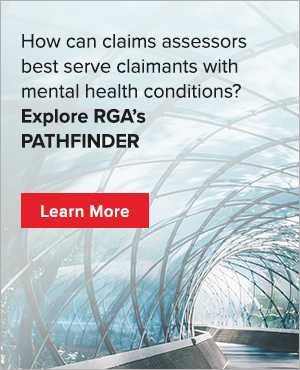Effective and empathetic service is critically important when managing mental health claims. Unfortunately, blood tests, scans, and the like provide limited, often less-than-useful guidance. Given these limitations, how can claims assessors provide the best experience?
The first step to resolving any challenge is to clearly define it. Where mental health claims are concerned, access to information is essential. Clinicians and insurance claims assessors often rely upon self-reporting by the patient, and sometimes their significant others.
The claims management process can become complicated when individuals suffering from a mental health condition may be unaware of, or unable to express, sensitivities related to their impairments. Sometimes, this can make it difficult for claims assessors to pursue a line of inquiry.
Expanding Insight
Recognizing the need to manage these unique challenges, claims assessors are actively seeking increased insight and expertise – particularly in relation to diagnosis, treatment, recovery, functional restoration, return to work, and personalized customer communication.
Current claims management practices were highlighted in a 2020 RGA survey of Australian psychiatrists acting as chief medical officers in the life insurance industry, and their responses point to an opportunity. The survey suggests claims assessors who develop a deeper understanding of the clinical complexities of certain presentations of mental illness can deliver greater potential benefit to customers. In addition, survey respondents predicted improvements to the timeliness and acuity of claim evaluations through this enhanced understanding.
Recognizing the need to manage these unique challenges, claims assessors are actively seeking increased insight and expertise.
Improving Outcomes
Mental health claims show no signs of abating. Indeed, all sectors of society are becoming increasingly aware of the global burden of adverse mental health conditions and of the importance of skillful and timely patient management. The World Health Organization (WHO) reported that in the first year of the pandemic, global prevalence of anxiety and depression increased by an estimated 25%.1 WHO also reported that the pandemic increased Global Burden of Disease (GBD) levels associated with mental health conditions, as measured by Disability-Adjusted Life Years (DALY).
The longer certain aspects of illness, illness conviction, and illness behavior go unidentified, the more unwell, and avoidant of wellness behaviors a person may become. Interrupting this spiral requires a collaborative effort by the claimant, significant others, clinicians, employers – and even insurers. In fact, early and skillful involvement from the insurer can promote positive attitudes and actions in a claimant and constructively influence support networks that enable the claimant to mitigate or manage a clinical condition.
Early and skillful involvement from the insurer can promote positive attitudes and actions in a claimant.
With a view to promoting best care management and quicker improvement in symptoms, claims assessors are increasingly seeking to expand their knowledge and fluency around mental health conditions. In so doing, they can be more proactive in contributing to the wellness of the claimant, their families, and the community.
RGA’s PATHFINDER claims training program includes a Mental Health Conditions course designed specifically to help meet this need. The training includes a set of learning modules designed to help anyone without clinical experience develop insight and understanding of common mental health conditions in general, and in particular, to apply these insights in the context of an insurance claim for disability income, total and permanent disability or medical reimbursement.
RGA clients can access PATHFINDER through RGA’s Global Claims Manual. PATHFINDER offers a suite of online modules that allow learners to engage with content through multiple media, including text, visuals, audio, and downloadable material. Learners can track and recognize success throughout the program while accumulating continuing professional development points. Watch a brief video to learn more.




